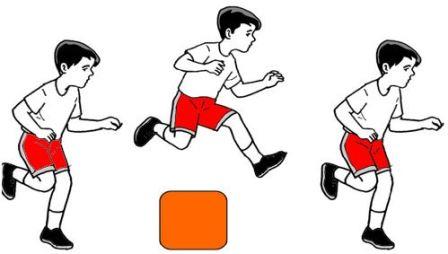Aspects of Affecting Maturity in Learning Motor Skills. Motor Skills in everyone is not the same or different. This difference is influenced by several factors, including: heredity, experiences in childhood, personal, environmental influences, and other factors that support the mastery of a skill.
Heredity factors that affecting maturity in motor skills learning
Talent of students inborn that are influenced by genetic factors. Because of that, of course, the talent of each child are not the same. One talent development efforts related to the sport can be realized through the process of teaching and learning in schools or through activities outside of school. In this case, an educator must understand these differences in order to facilitate the planning and implementing the learning process. Planning and implementation of the student learning process should consider the differences in students' talents.
Childhood experience
In childhood, children like running, skipping or jumping jacks, kick the ball, hit the ball, throw the ball and so forth. that experience of childhood is the main asset basic movement (motor abilities) who already owns. Based on that asset, the child will be able to perform physical activity (such as running, jumping, kicking, throwing, and so on), which is needed in any kind or sports.
Similarly, the strength of the muscles are formed by the experience of childhood. With the strength of the muscles he will be able to perform movements or physical activity in any sport. For children who have experience as a child as stated above, if given some techniques to him, he was not too difficult to learn. But otherwise, if a child who has no experience of motion in childhood, they will find it difficult to carry out the learning process of motion.

Environmental influence affecting maturity in motor skills learning
Environmental factors influence the development of talent motion. Family environment like sports will shape the children loved sports. The behavior of parents or members of the other families is a major factor a habit formers, and talent development of a child.
The behavior of the parents or people close to him will be copied and imitated by children. Thus, a good environment or an environment that has the facilities and infrastructure reasonably sufficient to talent development of motion, can support the achievement of learning motor skills.
Personal goal
Determination and willpower in the child to learn motor skills, is the main asset, which will develop willpower to learn. Learning progress, rooted in intrinsic motivation or willpower that born from in the child itself. that intrinsic motivation appear and develop if the child has a purpose, understand and know that the motor skills to be learned it is really beneficial to himself.
Besides the factors mentioned above, physiologically fatigue influence the learning process or practice. The process of fatigue in learning or practicing sports skills posed by the coordination of the function of the neuromuscular.
Basically the coordination of the muscle nerve function is a conditional reflex. In order to achieve a conditional reflex, there is a limiting factor that can not be ignored is repetition. Repetition of motion was not allowed to cause excessive fatigue on one or several muscles are concerned. That Reflexes can be happened because of their a habit or repetition of motion.
Fatigue will cause the loss of conditional reflexes partially or entirely. It depends on how long it reflexes is owned. This is in accordance with the opinion of Giriwiyono (1992: 80) that "conditional reflexes that have been owned for a long time and maintained / trained will lose 50% with the arrival of fatigue. This means that techniques motion error can happened by the arrival of fatigue. "
From the above, it can be concluded that the physiological factors (fatigue) effect on the level of student mastery of motor skills. The process of motor learning or practicing students will be disturbed and damaged if there is excessive fatigue. This will lead to irregularities of motion will resulting wrong motor coordination.
Irregularities of this motion will inhibit the formation of movements are studied. Therefore, the key steps to reduce the effects of excessive fatigue toward learning or practicing the motion is to establish a way to practice through the actual game.
Through the game the students will have funespecially if the game to perform right moves of techniques in order to get a victory. Thus, the movement patterns will be easily mastered, with teacher's notes provide strengthening in the form of punishment for students who make mistakes. With the reinforcement, students will be more cautious because they want to win the game.
That is the aspects affecting the maturity of children in learning motor skills that must be considered by teachers and practitioners of the sport, so we can provide a good foundation and useful motion when the child grows into an adult. Hopefully this article can be useful to the reader as well. Thanks.
